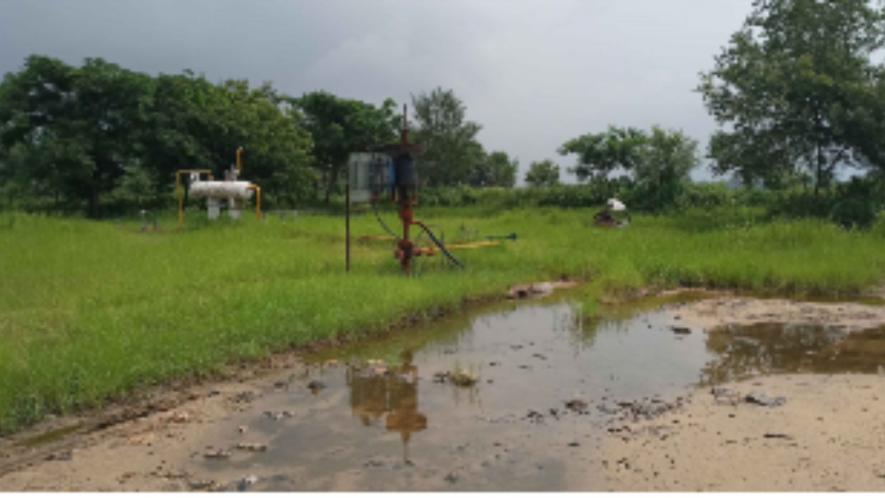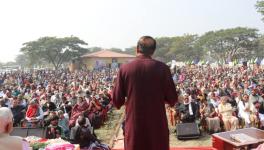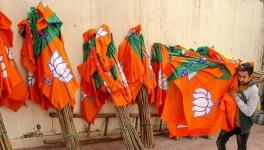Bengal’s GEECL Methane Extraction Plants Exploit Security Guards

The methane gas extraction station at Salma, Saltora Bankura, West Bengal.
The workers of Great Eastern Energy Corporation Limited (GEECL) have been extracting methane for more than a decade risking their lives and in constant fear of being sacked.
GEECL earns crores through the methane extracted at Saltora (Bankura) and Burnpur (Paschim Bardhaman) on both sides of the Damodar River.
The workers, especially guards, allege retrenchment threats and misbehaviour by the company management.
Now, GEECL has been permitted to extract methane from Central mines around several villages in Ardhagram Gram Panchayat areas under Mejia Block, Bankura.
Villagers have opposed the move. A few days ago, in the presence of high-ranking officers, including Bankura (general) additional district magistrate (ADM), Ardhagram villagers strongly opposed the decision at a public hearing at the Mejia Block office.
During the hearing, Dilip Mandal of Ardhagram, Lakshman Dhibar of Bhara, Biren Das of Mohona and several other villagers alleged that the meeting wasn’t publicised and was held 12 km away from the proposed extraction site.
They further alleged that GEECL has been extracting methane for more than a decade in the neighbouring Saltora without fulfilling any of its development promises.
Alleging the “exploitation of security personnel, who are forced to work for 24 hours”, they effused to allow methane extraction in Mejia.
Subsequently, ADM Pralay Raychoudhury said a decision will be taken after a video recording of the public hearing is sent to the West Bengal Pollution Control Board.
However, several workers from Saltora and Burnpur alleged that a decision would be taken under the direction of a Trinamool Congress leader and a state Cabinet minister.
A security guard at the gas extraction centre in Bamuntor village, Saltora.
SECURITY GUARDS LAID OFF
According to several security guards, the company used TMC members to sack 29 guards in Burnpur on January 14, 2020. Besides, criminal cases were filed against the security for resisting the brutal attack by the TMC members under the supervision of an influential Asansol leader, they alleged.
Surprisingly, some of the attackers were given jobs, the guards alleged.
“The workers who lost their jobs are desperate,” said CITU leader Toton Chattoraj. “A few days later at an official meeting in Durgapur, chief minister Mamata Banerjee asked the Asansol North MLA, the then-labour minister and current law minister Malay Ghatak to settle the matter. However, the 29 guards were never rehired.”
Niranjan Dhibar, a security guard of Kalajharia gas extraction station, Burnpur, was sacked.
Niranjan Dhibar, a guard of the 48 gas extraction centre at Kalajharia, Burnpur, was one of the 29 sacked guards.
“GEECL wanted to lay off several guards and had also discussed it with the security agency. A lie was propagated that the company was running at a loss. When we refused to believe, the company organised the attack,” Dhibar alleged.
“The 29 guards and their families remain hungry half the day,” he said adding that “CITU has been continuously agitating for us. The union will organise a protest before the company’s head office again on October 4”.
GAS EXTRACTION AND EXPLOITATION
Methane, formed during coalification (the transformation of organic plant material into coal), is extracted from coal seams. It is widely considered an ‘unconventional’ source of natural gas.
In 2001, the Geological Survey of India reported that methane could be extracted from the huge underground coal deposits on both sides of the Damodar in Saltora, Bankura, and Asansol, adjoining Burnpur.
Subsequently, the ministry of mines approved methane gas extraction with GEECL extracting the gas in Burnpur in 2007. In 2010, the company started extraction in Bamuntor and Salma Gram Panchayat’s several areas of the Saltora Block.
Former Saltora MLA Angad Bauri said that the GEECL was helped by the Panchayat and the villagers. “Initially, the company bought land from locals at market rates and set up some gas extraction stations.”
When TMC came to power, “land was bought through brokers with owners not receiving proper compensation. The company had promised to build roads, fund schools, plant trees and dispose of the toxic water that rises during extraction. However, none of these promises have been fulfilled,” Bauri alleged.
A member of a family that sold land at a nominal price was hired as a security guard at an extraction centre without an appointment letter. Since the guards are security agency employees, they have never been in touch with the company.
The security personnel are forced to perform various other tasks, including methane extraction.
As per GEECL, methane is extracted from 57 places in Burnpur and 43 in Saltora. After extraction in Saltora, the gas is transported to Ishwarda village, Bamuntor Gram Panchayat, through underground pipelines. Finally, it reaches the gas gathering station (GGS) at Burnpur through the pipeline under the Damodar River.
Similarly, gas extracted from Burnpur is transported to Shyamdihi village and then stored at the central gas gathering centre at Burnpur. Later, the gas is sold to various industries, including the Indian Iron and Steel Company (IISCO).
Asansol CITU leader Joton Majumdar said that the “company paid very low wages initially. CITU fought a long battle to treat the workers as miners and ensure an increase in wages”.
Currently, around 800 workers are employed in this project with most of them guards paid by the security agency. Guards in Saltora receive daily wages of Rs 695 while their counterparts in Burnpur are paid Rs 810.
Several guards alleged that their clothes and shoes become unfit within two months. When they complain to GEECL, it says the security agency is responsible for them.
“Despite not taking responsibility, company officers often threaten to dismiss us,” several guards, including Sudarshan Thandar of Bamuntor (Saltora) and Nitai Dutta of Kalajhariya (Burnpur) alleged.
Jagannath Tudu, who operates extraction centre number 22 in Burnpur, and his fellow workers said that an operator runs the generator at 10-12 gas extraction stations, but “the guards keep everything moving. The entire responsibility falls on them”.
“Initially, the guards were given 27 days of work per month. Since they started receiving wages at the Central rate through a movement led by CITU in 2017, the company reduced their numbers by giving various excuses through the security agency,” Tudu said.
“Now, one guard gets 20 days of work. Earlier, two guards were on the night shift but now only one handles the security.”
Ashutosh Banerjee, a guard at the Ishwarda centre and the Indian National Trinamool Trade Union Congress president of Saltora Block, said the centres are in bushy and deserted areas.
“Several lights at the centres are fused and it is difficult to operate at night. The guards stay under a shed of 5X5 feet in very poor conditions. If a guard falls ill at night, who will see to him? Has the company ever thought of this?” Banerjee said.
If anything is stolen from a gas extraction station, GEECL does not allow a guard to report to the police. Guards have to pay for the theft, they alleged. Banerjee had to pay compensation in an incident two years ago.
Nishit Chakroborty, a guard at the Ishwarda station, alleged that he was grievously injured when he tried to stop a few men from stealing at night a few months ago. Villagers and other guards took him to the hospital the next day. Company officials didn’t bother to ask about his condition during a routine visit to the centre.
Several security guards have also raised the issue of provident fund and pension. The security agency deducts Rs 800 from their monthly wages as PF and pension. The guards have been employed by multiple security agencies in the last 14 years. When a new agency takes over, the guards often find that the account of money deposited with the earlier agency are messed up without exact calculations.
Asim Kumar Mondal, who was the supervisor of the Saltora area, retired a year ago but has not yet received pension.
Biswajit Mondal, a farmer from Saburbandh village in Saltora, said toxic water that surfaces during extraction is disposed of in different parts of the villages.
“Cattle get sick from drinking this water and crops near the gas centre are being damaged. The company had promised to plant trees but not a single tree was planted,” he said.
Sanat Saha, an administrative officer at GEECL, said that gas extraction will start at 650 centres in Mejia, Bankura and several places in Purulia within a year. He refused to comment on the complaints of guards and other workers.
The writer covers the Jangal Mahal region for ‘Ganashakti’ newspaper in West Bengal. The views are personal.
Get the latest reports & analysis with people's perspective on Protests, movements & deep analytical videos, discussions of the current affairs in your Telegram app. Subscribe to NewsClick's Telegram channel & get Real-Time updates on stories, as they get published on our website.
























